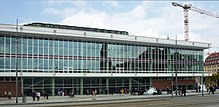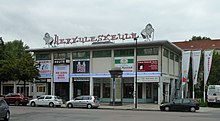Hercules Club (cabaret)
The Herkuleskeule is a cabaret ensemble and a cabaret theater in Dresden .
history
The cabaret was founded on May 1st, 1961 by Manfred Schubert .
Even before it was founded, there was a Hercules club in Dresden . Between 1954 and 1959, actors from the Staatsschauspiel met under the direction of Otto Stark in their free time to do cabaret. When Otto Stark went to Distel in Berlin after the 6th program in the summer of 1959 , the group disbanded.
After the Thistle in Berlin in 1953 and the Leipziger Pfeffermühle in Leipzig in 1954 as the first professional cabaret in the GDR, a professional cabaret was also to be founded in Dresden in 1960. The director's choice fell on Manfred Schubert. The Dresden resident had previously directed the amateur cabaret Die Funken from the state broadcaster Dresden for a long time and was the director of the Berlin cabaret Die Drum . Schubert built on old relationships and the earlier writers of the Herkuleskeulchen and the Funken , Ulrich Pohle, Günter Richter, Rudolf Thomas and Wolfgang Reizenstein, contributed the first texts. On May 1, 1961, the premiere of the first play No Joke Complaints took place in the Martin Andersen Nexö youth club on Alaunstrasse.
The new cabaret was initially housed in the ruins of the Reformed Church on Friedrichsring . Only a part of the performances took place here, mostly the ensemble was on tours through the GDR. A few months after the group was founded, Gisela Grube, Gertraude Grütze and Hans Glauche joined the group; only Höfler and Schubert remained from the core team of the first program.
In 1965, the cabaret moved to the upper floor of a residential area restaurant complex at Sternplatz 1, where it was located until April 27, 2017. The building complex was built from 1963 to 1965 under the urban planning direction of the architects Herbert Schneider and Kurt Röthig .
In 1969 a cabaret program was banned. Where do we live then , which consisted of four parts, had to be replaced by a 20-numbered version. After Jochen Höfler and Gertraude Grütze left the ensemble, Jutta Rockstroh and Fritz Ehlert and in 1971 Werner Knodel joined the ensemble. The ensemble that was created in this way represented the Dresden Hercules Club for many years . Wolfgang Zobel became a dramaturge, Horst Elsner took over the musical direction in 1972.
Schubert was delegated to the party school and therefore brought Wolfgang Schaller , who was then a teacher in Görlitz and directed a youth cabaret, to Dresden as a dramaturge and author. Above all, the cabaret pieces written by the writing team Schaller and Peter Ensikat , which were re-enacted in many theaters in the GDR, made the Hercules Club a trademark for political cabaret in the GDR. The Eulenspiegel wrote: "The Hercules Club has acted like an icebreaker in all the years of paralysis and helped others with its courage."
The first of their Politrevuen was called Citizens, Protect Your Plants . With these political revues, also known as “discussion pieces”, Ensikat and Schaller became the most successful team of authors in GDR cabaret and made the house known in the Federal Republic as well.
The Herkuleskeule had its first appearance in the Federal Republic of Germany in 1987 in St. Ingbert in Saarland . This appearance was part of an official cultural agreement that was negotiated between the then Saarland Prime Minister Oskar Lafontaine and the GDR State Council Chairman Erich Honecker . The first western appearances of the GDR cabarets Academixer and Leipziger Pfeffermühle in St. Ingbert were also part of this agreement.
In the same year two cabarets from the two German states, the Münchner Lach- und Schießgesellschaft and the Herkuleskeule, took place together . Gerhard Polt and Dieter Hildebrandt played their part in the fact that the Dresdeners were the first GDR cabaret to perform in the Munich Residenztheater before the Wall came down .
Since 1986, Wolfgang Schaller artistic director of the Dresden cabaret, from 1997 to July 2012, he was artistic director . He lures the audience with the means of entertainment in order to then suddenly serve them up with uncomfortable content. The best example of this is The Little Man from the Heimaterde program , who turns into a berserk out of sheer love of order (“All a head shorter!”). From January 1, 2020, his son Philipp Schaller will take over the artistic direction, who has co-developed and written numerous cabaret evenings for the Herkuleskeule since 2005.
Every year around 360 performances took place in the Haus am Sternplatz (210 seats).
On April 28, 2017, the cabaret moved to the Dresden Kulturpalast . It has 244 places in the basement.
Around 70,000 visitors come to 350 performances every year. There are also 80 guest appearances in Germany.
The cabaret artists Hans Glauche and Fritz Ehlert as » Gustav and Erich «, Wolfgang Stumph , Uwe Steimle , Hans-Günther Pölitz and Manfred Breschke are the main reasons for the good reputation .
The ensemble includes (as of 2020) u. a. Birgit Schaller, Brigitte Heinrich , Rainer Bursche, Michael Rümmler, Detlef Nier, Anna Marie Lehmann and Philipp Schaller as well as the musicians Jens Wagner, Volker Fiebig and Thomas Wand. The cabaret's manager is Arnim Proft.
marketing and advertisement
A tram of the Dresden public transport company was pasted as an advertising space for the Herkuleskeule. Since 2019 it has been traveling on various lines in the city of Dresden.
Awards
- 2000 Ravensburger Kupferle
- 2008 Chemnitz bee
literature
- Hermann Werner Kubsch , Alexander Bauer, Peter Ensikat et al .: The "Herkuleskeule" and other cabaret from Dresden . In: Ernst Günther, Heinz P. Hofmann, Walter Rösler (eds.): Cassette. An almanac for the stage, podium and ring (= cassette ). No. 4 . Henschelverlag Art and Society, Berlin 1980, p. 52-94 .
Individual evidence
- ^ Walter May , Werner Pampel and Hans Konrad : Architectural Guide GDR, Dresden District . VEB Verlag für Bauwesen, Berlin 1979, number 67.
- ↑ a b c management. Hercules Club, accessed on May 1, 2020 .
- ↑ Katrin Koch: When the father with the son ... A great piece of the Hercules club! In: TAG24 . February 6, 2019, accessed February 21, 2019 .
- ^ Program flyer for the Hercules Club
- ^ Ensemble. Hercules Club, accessed on May 1, 2020 .
Web links
Coordinates: 51 ° 2 ′ 49.9 " N , 13 ° 43 ′ 33.5" E


